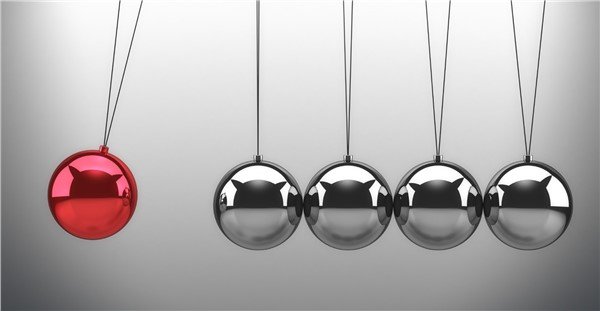The swinging pendulum
With almost everything in life, and possibly everything in the universe, states, that is the current conditions, are never static and more often times than not, they obey cycles. We even learn from an early age to identify or at least recognize the patterns that water follows, understanding that change is what's being observed and not the disappearance of elements.

img src
Curiously enough these cyclical models continue to echo in our own creations, and it seems somewhat obvious that they would, since we are simply building on pre-established ideas that we recognize as natural, that we recognize as working. This somewhat philosophical foundation or preamble, if you will, is participating of my internal dialogue this morning since it seems to me that some of us are failing to see how this whole idea of decentralization is just part of a cycle too.
Allow me to explain
In the early days of the internet, back when copper lines and 14k modems ruled the word, hundreds if not thousands of websites were ran out of people's garages. Yes, using a mere 14k upload speed that probably made the process of loading pictures as exciting as watching paint dry. You could say then, and you would be right, that the internet was decentralized, but this of course did not mean it was fast or even great.
Why did we move away from decentralization when it comes to the internet? Well, to me the answer is quite obvious too: Market Cycles. When the .com bubble was at it's biggest hype, when creating a website as ridiculous as pets.com could bring in millions of dollars simply because, there was an instant need for speed. This is not to be conflated with adoption, which of course did not come until some time later, but the space, the .com ecosystem was all of the sudden how you get rich, and in our free market capitalistic models, smart and visionary entrepreneurs recognized this opportunity.
When all this new money came into the space, the infrastructure of course, soaked up a lot of it, and fast speed internet began to take shape. DSL, and even T1 lines were not exclusive to people with means anymore, and thus the software being developed for this upgraded tcp/ip ecosystem began to put on some weight. In other words, it was not required to optimize that much anymore.
This market dynamics along with the innovative push forward created the niche that we understand today as cloud computing, and this in turn moved the needle towards centralization considerably. Today we have services like Amazon Web Services who possibly process more information that we could possibly imagine with our limited mental bandwidth.
But we are swinging back
Not truly because Amazon or Google are evil corporations that are trying to destroy our way of life, but because balance is always a journey we tend to work towards, and it's obvious we've been dabbling on the extremes for a bit too long.
I won't go as far to say that the future is decentralized, in the sense that I believe centralized systems have their place as well. That being said, the conversation is often about one or the other, when centralization/decentralization is best seen as a spectrum.
It's my speculation that anything that is mission critical in terms of trust, in the future, will probably adopt the distributed ledger technology we commonly refer to as blockchain. Everything else, it depends on what you are trying to accomplish, because not everything should be decentralized anyhow.

One age ends, and another begins. It is the way of things. But, it doesn't happen all at once.
To listen to the audio version of this article click on the play image.

Brought to you by @tts. If you find it useful please consider upvoting this reply.
I 100% agree, centralization and decentralization isn't a yes or no question, it's more of a gradient, for example, EOS is to me semi-decentralized, it isn't as decentralized as ETH(even though the mining power is really centralized) but it isn't as centralized as Amazon or Google, and it's good to be semi-decentralized, it allows one to maybe make stuff that they wouldn't be able to make in decentralized chains...I think there is a place for everything, the future is decentralized, centralized, semi-centralized. There are all types of chains and ideas out there, the world is a big place, and who knows, the galaxy and universe are even bigger, there is a place for every type of chain and service.
The amount of capital flowing into the technology whether for private or public uses, shows the demand for improvements in processes that could lead to efficiency and productivity. Like the dotcom times, the boom was needed to bring capital to build the foundation of what is yet to come.
Posted using Partiko iOS
We rarely see quite simple open and shut cases, everything tends to be a trade off where you accept limitations in order for the enhanced benefits elsewhere. I do agree not everything will suit blockchain, but many things do there is now a blockchain based coffee auction to allow growers in Guatemala to sell their raw coffee product globally.
https://auction.yave.io/en/
Posted using Partiko iOS
Hi @meno!
Your post was upvoted by @steem-ua, new Steem dApp, using UserAuthority for algorithmic post curation!
Your UA account score is currently 5.987 which ranks you at #325 across all Steem accounts.
Your rank has not changed in the last three days.
In our last Algorithmic Curation Round, consisting of 215 contributions, your post is ranked at #10.
Evaluation of your UA score:
Feel free to join our @steem-ua Discord server